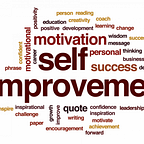Top 10 Self-improvement Books Eveyone Should Read
Here’s a list of the top 10 self-improvement books which have changed and improved the lives of millions of people:
10. Effortless
In “Effortless,” Greg McKeown builds on his previous book, “Essentialism,” to explore the concept of making important tasks and decisions easier and more effortless. He argues that by focusing on the few essential things that really matter, and finding ways to make them effortless, we can achieve more with less stress and effort. The book is filled with practical tips and strategies for simplifying our lives, reducing decision fatigue, and creating more space for what really matters. McKeown also emphasizes the importance of rest, play, and recovery in achieving our goals. As he writes, “The faster and harder we push, the more vulnerable we are to mistakes, stress and burnout.”
9. Deep Work
“Deep Work” by Cal Newport is a productivity book that focuses on the importance of focused, undistracted work in a world filled with constant distractions. Newport argues that deep work is essential for achieving high levels of productivity and success, and that it’s becoming increasingly rare in a world where distractions are constant. The book provides practical tips and strategies for cultivating deep work, including how to create a distraction-free environment, manage your time effectively, and build routines that support deep work. As Newport writes, “The ability to perform deep work is becoming increasingly rare at exactly the same time it is becoming increasingly valuable in our economy.”
8. Psycho-Cybernetics
“Psycho-Cybernetics” by Maxwell Maltz is a self-help classic that explores the connection between our self-image and our ability to achieve our goals. Maltz argues that by changing our self-image and beliefs, we can improve our performance in every area of life. The book provides practical techniques for improving self-image and building self-confidence, including visualization, positive affirmations, and goal-setting. As Maltz writes, “You will act like the sort of person you conceive yourself to be.”
7. Atomic Habits
“Atomic Habits” by James Clear is a practical guide to building good habits and breaking bad ones. Clear provides a framework for creating small, consistent changes that can have a big impact over time. He emphasizes the importance of focusing on systems rather than goals, and provides practical tips for making habit changes stick. As Clear writes, “You do not rise to the level of your goals. You fall to the level of your systems.”
6. The 4-Hour Workweek
“The 4-Hour Workweek” by Tim Ferriss is a book that challenges the traditional idea of work and retirement. Ferriss provides a framework for building a life of flexibility and freedom, including practical tips for outsourcing and automating tasks. He also provides strategies for building passive income streams and traveling the world. As Ferriss writes, “The question you should be asking isn’t, ‘What do I want?’ or ‘What are my goals?’ but ‘What would excite me?’”
5. The 48 Laws of Power
“The 48 Laws of Power” by Robert Greene is a book that explores the dynamics of power in human relationships. Greene draws on historical and contemporary examples to illustrate the principles of power, including strategies for gaining and maintaining control. The book provides a controversial look at the darker side of human nature, and the ways in which power can be both seductive and corrupting. As Greene writes, “Power is not what we do but what is done to us.”
4. The Way of the Superior Man
“The Way of the Superior Man” by David Deida is a book that challenges men to embrace their masculine nature and cultivate their full potential. The book explores topics such as relationships, spirituality, and sexuality, providing a guide for men to live authentically and with purpose. Deida encourages men to embrace their masculine edge while remaining sensitive to the needs of others. As Deida writes, “To be fully alive, fully human, and completely awake is to be continually thrown out of the nest.”
3. The Subtle Art of Not Giving a F*ck
“The Subtle Art of Not Giving a F*ck” by Mark Manson is a book that challenges readers to rethink their priorities and values in life. Manson encourages readers to embrace the inevitable struggles of life and focus on what truly matters. He argues that true happiness comes from accepting responsibility for one’s own life and making meaningful choices. As Manson writes, “Pain is an inextricable part of life and, by trying to avoid it, we only create more of it.”
2. The Magic of Thinking Big
“The Magic of Thinking Big” by David J. Schwartz is a self-help classic that teaches readers how to develop the mindset and habits of successful people. The book encourages readers to think big and believe in their own potential, providing practical strategies for overcoming fear and achieving goals. Schwartz argues that success is not determined by one’s circumstances, but by their attitude and actions. As Schwartz writes, “Believe it can be done. When you believe something can be done, really believe, your mind will find the ways to do it.”
1. How to Win Friends & Influence People
“How to Win Friends & Influence People” by Dale Carnegie is a classic self-help book that teaches readers how to improve their social skills and build strong relationships. Carnegie offers practical advice on how to communicate effectively, show genuine interest in others, and navigate conflicts. The book has sold millions of copies and remains a popular resource for anyone looking to improve their interpersonal skills. As Carnegie writes, “You can make more friends in two months by becoming interested in other people than you can in two years by trying to get other people interested in you.”
